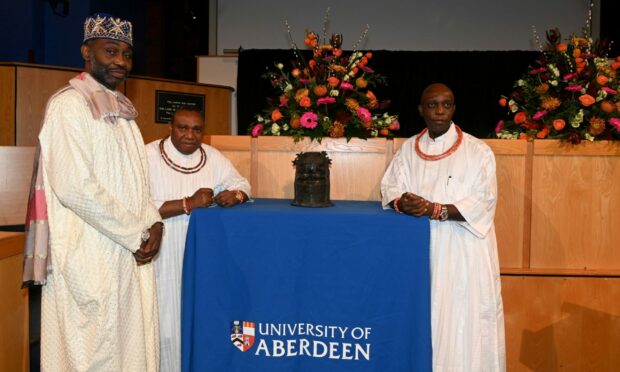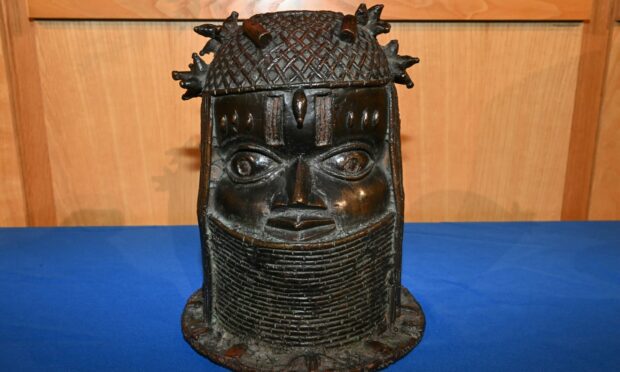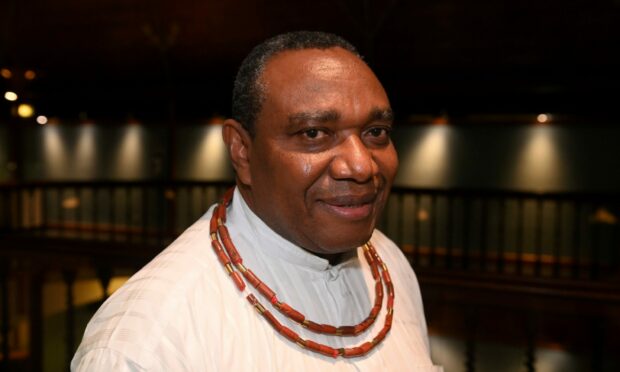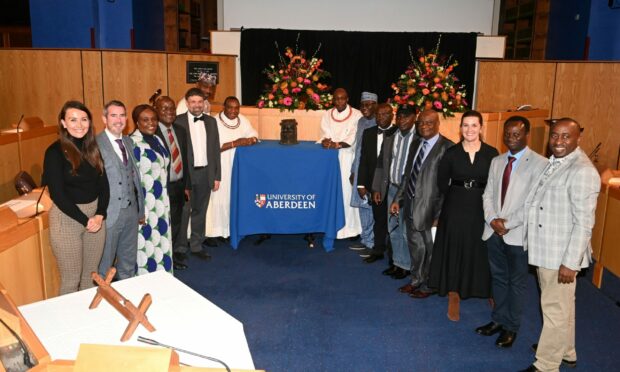A treasured religious and cultural artefact looted from Nigeria by the British forces has been returned to its rightful owner – after more than a century.
At a special ceremony held at Aberdeen University, a Benin Bronze statue hailed as a “representation of identity and culture” was passed on to the people of Nigeria in the spirit of “doing the right thing”.
The sculpture, which depicts the head of an Oba (King), is one of thousands artefacts, which were “immorally” stolen during the destruction of Benin City by a British military expedition in 1897.
It was later purchased by Aberdeen University in 1957, where it had remained since as part of their artefact collections.
Work to return the statue was initiated several years ago after it was confirmed it was one of the so-called “bronzes”, acquired when the royal palace of the Oba was burned and robbed.
‘The return of stolen art is the right thing to do’
His Royal Majesty, Oba of Benin, Omo N’Oba N’Edo Uku Akpolokpolo, Ewuare II, said that keeping stolen artefacts away from their homeland is “wrong”.
He said: “Much has been said about the significance of heritage art and, in spite of the occasional attempts in some quarters to downplay their cultural and religious relevance, these works are often imbued with the spirit of the people from whom they were taken.
“Regardless of the resistance in some quarters, the return of stolen art is the right thing to do.
“In any event, we thank Aberdeen University for this noble act of returning our bronze work.
“We hope that other institutions worldwide will see the injustice when they insist on holding on to items, which in fact should be a reminder to them of the great injustice that was inflicted on a people so far away and so long ago.”
‘These sculptures represent us and our ancestors’
The Obasuyi of Benin Chief Charles Uwensuyi-Edosomwan added: “For us this is the recovery of a long-lost family member.
“These sculptures represent us. They are wrongly described as art pieces – they are not.
“It’s flattering that people find them beautiful but they weren’t carved for their beauty for them to be displayed as art.
“For us they are so much more than that and they need to come back to us.
“It’s a representation of us and our ancestors – those who have been there before us and watch over us now, and the ones we look back to when we want to move forward.”
Returning an item of such ‘great culture significance’ is the ‘right thing to do’
The process of a legal transfer began in March last year with the university working to support the timescales identified by the Nigerian partners for the sculpture’s physical return.
The partners have now committed to the safe-keeping of the bronze “in such a manner and in true essence of its sovereignty”, until it can be put on public display at the Oba’s palace or other agreed place.
Professor George Boyne, principal and vice-chancellor of the Aberdeen University, said: “Over the last 40 years the Benin Bronzes have become important symbols of injustice.
“It would not have been right to have retained an item of such great cultural significance that was acquired in such reprehensible circumstances.
“The university took a proactive approach to identify the appropriate people to discuss what to do and we are extremely grateful for the collective approach taken by the partners in Nigeria, which has facilitated this return.
“We are delighted to welcome our guests representing the Federal Republic of Nigeria, the Kingdom of Benin, and the National Commission for Museums and Monuments and commend their spirit of co-operation in making this possible.”



